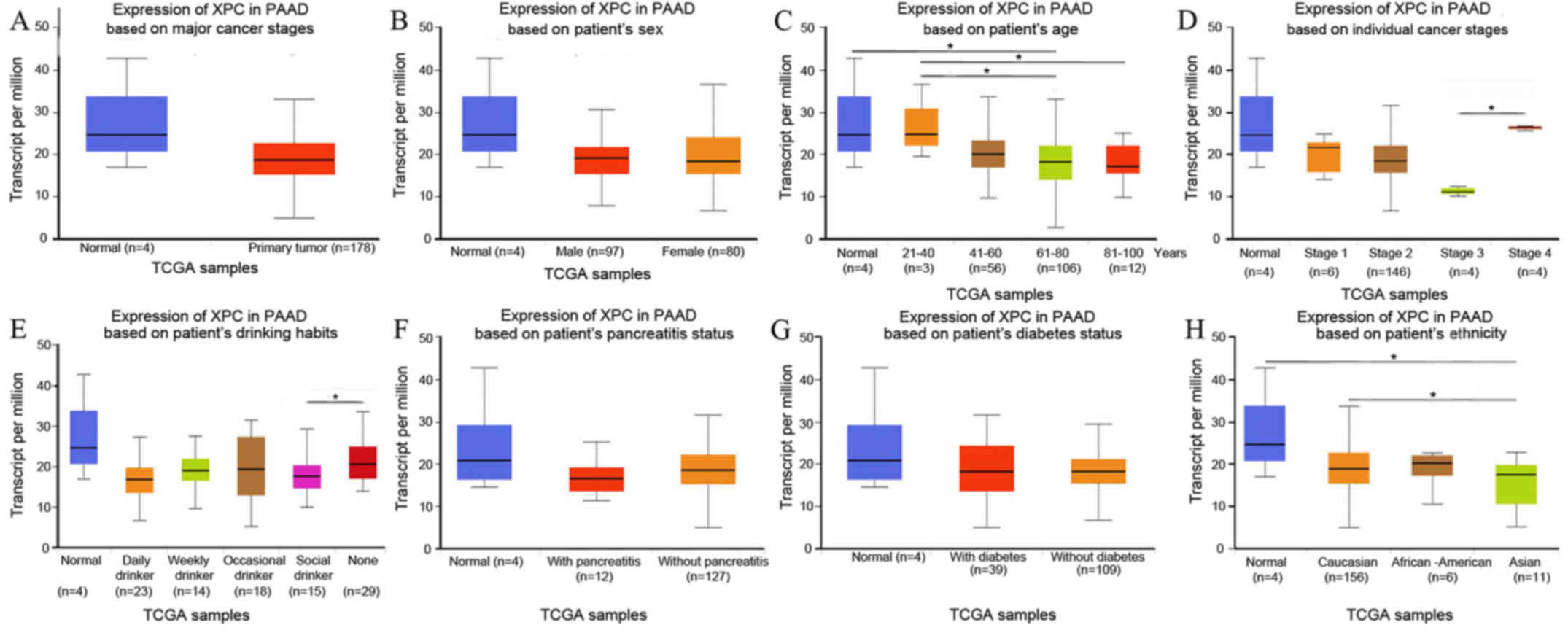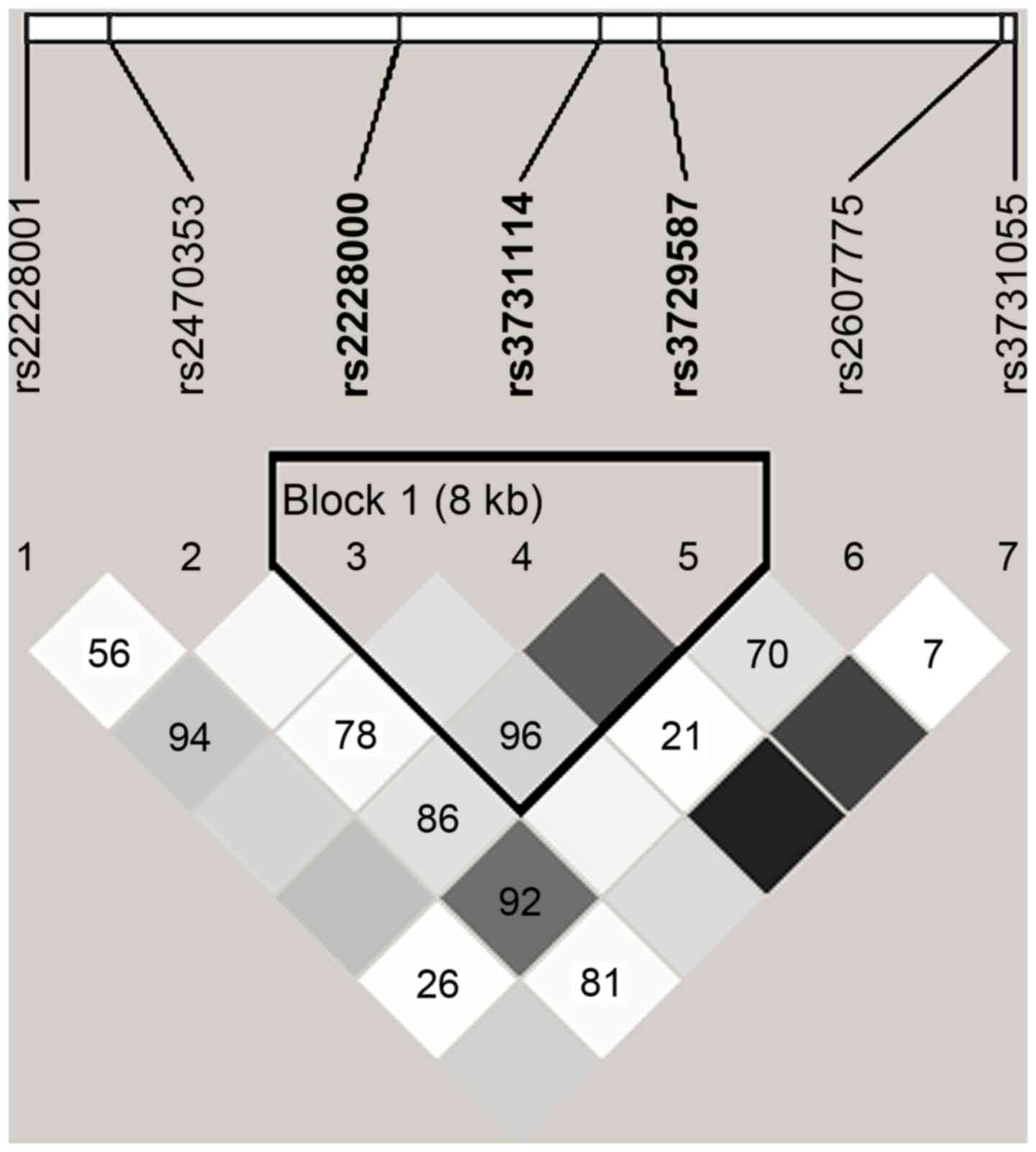|
1
|
Siegel RL, Miller KD and Jemal A: Cancer
statistics, 2015. CA Cancer J Clin. 65:5–29. 2015. View Article : Google Scholar : PubMed/NCBI
|
|
2
|
Chakraborty S, Baine MJ, Sasson AR and
Batra SK: Current status of molecular markers for early detection
of sporadic pancreatic cancer. Biochim Biophys Acta. 1815:44–64.
2011.PubMed/NCBI
|
|
3
|
Trede M, Schwall G and Saeger HD: Survival
after pancreatoduodenectomy. 118 consecutive resections without an
operative mortality. Ann Surg. 211:447–458. 1990. View Article : Google Scholar : PubMed/NCBI
|
|
4
|
Kang MJ, Jang JY, Chang YR, Kwon W, Jung W
and Kim SW: Revisiting the concept of lymph node metastases of
pancreatic head cancer: Number of metastatic lymph nodes and lymph
node ratio according to N stage. Ann Surg Oncol. 21:1545–1551.
2014. View Article : Google Scholar : PubMed/NCBI
|
|
5
|
Ryan DP, Hong TS and Bardeesy N:
Pancreatic adenocarcinoma. N Eng J Med. 371:1039–1049. 2014.
View Article : Google Scholar
|
|
6
|
DiMagno EP, Reber HA and Tempero MA: AGA
technical review on the epidemiology, diagnosis, and treatment of
pancreatic ductal adenocarcinoma. American Gastroenterological
Association. Gastroenterol. 117:1464–1484. 1999. View Article : Google Scholar
|
|
7
|
Lamerz R: Role of tumour markers,
cytogenetics. Ann Oncol 10 Suppl. 4:145–149. 1999. View Article : Google Scholar
|
|
8
|
Pandol S, Gukovskaya A, Edderkaoui M,
Dawson D, Eibl G and Lugea A: Epidemiology, risk factors, and the
promotion of pancreatic cancer: Role of the stellate cell. J
Gastroenterol Hepatol. 27 Suppl 2:S127–S134. 2012. View Article : Google Scholar
|
|
9
|
Krejs GJ: Pancreatic cancer: Epidemiology
and risk factors. Dig Dis. 28:355–358. 2010. View Article : Google Scholar : PubMed/NCBI
|
|
10
|
Dou K, Xu Q and Han X: The association
between XPC Lys939Gln gene polymorphism and urinary bladder cancer
susceptibility: A systematic review and meta-analysis. Diagn
Pathol. 8:1122013. View Article : Google Scholar : PubMed/NCBI
|
|
11
|
Li L, Peterson C and Legerski R: Sequence
of the mouse XPC cDNA and genomic structure of the human XPC gene.
Nucleic Acids Res. 24:1026–1028. 1996. View Article : Google Scholar : PubMed/NCBI
|
|
12
|
Melis JP, Luijten M, Mullenders LH and van
Steeg H: The role of XPC: Implications in cancer and oxidative DNA
damage. Mutat Res. 728:107–117. 2011. View Article : Google Scholar : PubMed/NCBI
|
|
13
|
Khan SG, Muniz-Medina V, Shahlavi T, Baker
CC, Inui H, Ueda T, Emmert S, Schneider TD and Kraemer KH: The
human XPC DNA repair gene: Arrangement, splice site information
content and influence of a single nucleotide polymorphism in a
splice acceptor site on alternative splicing and function. Nucleic
Acids Res. 30:3624–3631. 2002. View Article : Google Scholar : PubMed/NCBI
|
|
14
|
Sugasawa K, Ng JM, Masutani C, Iwai S, Van
der Spek PJ, Eker AP, Hanaoka F, Bootsma D and Hoeijmakers JH:
Xeroderma pigmentosum group C protein complex is the initiator of
global genome nucleotide excision repair. Mol Cell. 2:223–232.
1998. View Article : Google Scholar : PubMed/NCBI
|
|
15
|
Duell EJ, Bracci PM, Moore JH, Burk RD,
Kelsey KT and Holly EA: Detecting pathway-based gene-gene and
gene-environment interactions in pancreatic cancer. Cancer
Epidemiol Biomarkers Prev. 17:1470–1479. 2008. View Article : Google Scholar : PubMed/NCBI
|
|
16
|
Wang L, Lin DX, Lu XH, Miao XP and Li H:
Polymorphisms of the DNA repair genes XRCC1 and XPC: Relationship
to pancreatic cancer risk. Wei Sheng Yan Jiu. 35:534–536. 2006.(In
Chinese). PubMed/NCBI
|
|
17
|
Zhao F, Shang Y, Zeng C, Gao D and Li K:
Association of single nucleotide polymorphisms of DNA repair genes
in NER pathway and susceptibility to pancreatic cancer. Int J Clin
Exp Pathol. 8:11579–11586. 2015.PubMed/NCBI
|
|
18
|
McWilliams RR, Bamlet WR, Cunningham JM,
Goode EL, de Andrade M, Boardman LA and Petersen GM: Polymorphisms
in DNA repair genes, smoking, and pancreatic adenocarcinoma risk.
Cancer Res. 68:4928–4935. 2008. View Article : Google Scholar : PubMed/NCBI
|
|
19
|
Tabor HK, Risch NJ and Myers RM:
Candidate-gene approaches for studying complex genetic traits:
Practical considerations. Nat Rev Genet. 3:391–397. 2002.
View Article : Google Scholar : PubMed/NCBI
|
|
20
|
Hirooka N, Kadowaki T, Sekikawa A, Ueshima
H, Choo J, Miura K, Okamura T, Fujiyoshi A, Kadowaki S, Kadota A,
et al: Influence of cigarette smoking on coronary artery and aortic
calcium among random samples from populations of middle-aged
Japanese and Korean men. J Epidemiol Community Health. 67:119–124.
2013. View Article : Google Scholar : PubMed/NCBI
|
|
21
|
Lalitha S: Primer Premier 5. Biotech
Software Intern Rep. 1:62000.
|
|
22
|
Chandrashekar DS, Bashel B, Balasubramanya
SAH, Creighton CJ, Ponce-Rodriguez I, Chakravarthi BVSK and
Varambally S: UALCAN: A portal for facilitating tumor subgroup gene
expression and survival analyses. Neoplasia. 19:649–658. 2017.
View Article : Google Scholar : PubMed/NCBI
|
|
23
|
Francisco G, Menezes PR, Eluf-Neto J and
Chammas R: XPC polymorphisms play a role in tissue-specific
carcinogenesis: A meta-analysis. Eur J Hum Genet. 16:724–734. 2008.
View Article : Google Scholar : PubMed/NCBI
|
|
24
|
Shen H, Sturgis EM, Khan SG, Qiao Y,
Shahlavi T, Eicher SA, Xu Y, Wang X, Strom SS, Spitz MR, et al: An
intronic poly (AT) polymorphism of the DNA repair gene XPC and risk
of squamous cell carcinoma of the head and neck: A case-control
study. Cancer Res. 61:3321–3325. 2001.PubMed/NCBI
|
|
25
|
Marín MS, López-Cima MF, García-Castro L,
Pascual T, Marrón MG and Tardón A: Poly (AT) polymorphism in intron
11 of the XPC DNA repair gene enhances the risk of lung cancer.
Cancer Epidemiol Biomarkers Prev. 13:1788–1793. 2004.PubMed/NCBI
|
|
26
|
Jin B, Dong Y, Zhang X, Wang H and Han B:
Association of XPC polymorphisms and lung cancer risk: A
meta-analysis. PLoS One. 9:e939372014. View Article : Google Scholar : PubMed/NCBI
|
|
27
|
Guo W, Zhou RM, Wan LL, Wang N, Li Y,
Zhang XJ and Dong XJ: Polymorphisms of the DNA repair gene
xeroderma pigmentosum groups A and C and risk of esophageal
squamous cell carcinoma in a population of high incidence region of
North China. J Cancer Res Clin Oncol. 134:263–270. 2008. View Article : Google Scholar : PubMed/NCBI
|
|
28
|
Wang Y, Li Z, Liu N and Zhang G:
Association between CCND1 and XPC polymorphisms and bladder cancer
risk: A meta-analysis based on 15 case-control studies. Tumour
Biol. 35:3155–3165. 2014. View Article : Google Scholar : PubMed/NCBI
|
|
29
|
Paszkowska-Szczur K, Scott RJ, Górski B,
Cybulski C, Kurzawski G, Dymerska D, Gupta S, van de Wetering T,
Masojć B, Kashyap A, et al: Polymorphisms in nucleotide excision
repair genes and susceptibility to colorectal cancer in the Polish
population. Mol Biol Rep. 42:755–764. 2015. View Article : Google Scholar : PubMed/NCBI
|
|
30
|
Paszkowska-Szczur K, Scott RJ,
Serrano-Fernandez P, Mirecka A, Gapska P, Górski B, Cybulski C,
Maleszka R, Sulikowski M, Nagay L, et al: Xeroderma pigmentosum
genes and melanoma risk. Int J Cancer. 133:1094–1100. 2013.
View Article : Google Scholar : PubMed/NCBI
|
|
31
|
Sak SC, Barrett JH, Paul AB, Bishop DT and
Kiltie AE: The polyAT, intronic IVS11-6 and Lys939Gln XPC
polymorphisms are not associated with transitional cell carcinoma
of the bladder. Br J Cancer. 92:2262–2265. 2005. View Article : Google Scholar : PubMed/NCBI
|
|
32
|
Sanyal S, Festa F, Sakano S, Zhang Z,
Steineck G, Norming U, Wijkström H, Larsson P, Kumar R and Hemminki
K: Polymorphisms in DNA repair and metabolic genes in bladder
cancer. Carcinogenesis. 25:729–734. 2004. View Article : Google Scholar : PubMed/NCBI
|
|
33
|
Sak SC, Barrett JH, Paul AB, Bishop DT and
Kiltie AE: Comprehensive analysis of 22 XPC polymorphisms and
bladder cancer risk. Cancer Epidemiol Biomarkers Prev.
15:2537–2541. 2006. View Article : Google Scholar : PubMed/NCBI
|
|
34
|
Cheng AJ, Mao YM and Cui RZ: The effect of
gene polymorphism in promoter and intron 1 on human ApoA I
expression. Zhonghua Yi Xue Yi Chuan Xue Za Zhi. 23:610–613.
2006.(In Chinese). PubMed/NCBI
|
|
35
|
Duan ZX, Zhu PF, Dong H, Gu W, Yang C, Liu
Q, Wang ZG and Jiang JX: Functional significance of the TLR4/11367
polymorphism identified in Chinese Han population. Shock.
28:160–164. 2007. View Article : Google Scholar : PubMed/NCBI
|
|
36
|
Kinslow CJ, El-Zein RA, Hill CE, Wickliffe
JK and Abdel-Rahman SZ: Single nucleotide polymorphisms 5′ upstream
the coding region of the NEIL2 gene influence gene transcription
levels and alter levels of genetic damage. Genes Chromosomes
Cancer. 47:923–932. 2008. View Article : Google Scholar : PubMed/NCBI
|
|
37
|
Law AJ, Kleinman JE, Weinberger DR and
Weickert CS: Disease-associated intronic variants in the ErbB4 gene
are related to altered ErbB4 splice-variant expression in the brain
in schizophrenia. Hum Mol Genet. 16:129–141. 2007. View Article : Google Scholar : PubMed/NCBI
|
|
38
|
Qiao B, Ansari AH, Scott GB, Sak SC,
Chambers PA, Elliott F, Teo MT, Bentley J, Churchman M, Hall J, et
al: In vitro functional effects of XPC gene rare variants from
bladder cancer patients. Carcinogenesis. 32:516–521. 2011.
View Article : Google Scholar : PubMed/NCBI
|
|
39
|
Bai Y, Xu L, Yang X, Hu Z, Yuan J, Wang F,
Shao M, Yuan W, Qian J, Ma H, et al: Sequence variations in DNA
repair gene XPC is associated with lung cancer risk in a Chinese
population: A case-control study. BMC Cancer. 7:812007. View Article : Google Scholar : PubMed/NCBI
|
|
40
|
Maisonneuve P and Lowenfels AB:
Epidemiology of pancreatic cancer: An update. Dig Dis. 28:645–656.
2010. View Article : Google Scholar : PubMed/NCBI
|
|
41
|
Lee YJ, Shim HS, Kang YA, Hong SJ, Kim HK,
Kim H, Kim SK, Choi SH, Kim JH and Cho BC: Dose effect of cigarette
smoking on frequency and spectrum of epidermal growth factor
receptor gene mutations in Korean patients with non-small cell lung
cancer. J Cancer Res Clin Oncol. 136:1937–1944. 2010. View Article : Google Scholar : PubMed/NCBI
|
















